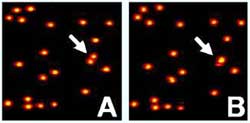This area deals with the fundamental laws and building blocks of nature and how they interact, the properties and the behavior of matter, and research into space and time and their structures.
innovations-report provides in-depth reports and articles on subjects such as astrophysics, laser technologies, nuclear, quantum, particle and solid-state physics, nanotechnologies, planetary research and findings (Mars, Venus) and developments related to the Hubble Telescope.

An international team of physicists working at the Antiproton Decelerator (AD) facility at CERN has announced the first controlled production of large numbers of antihydrogen atoms at low energies. After mixing cold clouds of trapped positrons and antiprotons – the antiparticles of the familiar electron and proton – under closely monitored conditions, the ATHENA collaboration has identified antihydrogen atoms, formed when positrons bind together with antiprotons. The results are published online toda

Physicists have just achieved the world’s first controlled production of anti-hydrogen atoms, the crucial first step towards precision studies of its properties.
This achievement has opened up the potential to cool, trap and study anti-atoms.
A team from the University of Wales – Swansea, led by Professor Michael Charlton, played a key role in this major breakthrough as part of an international consortium, ATHENA. The Swindon based Engineering and Physical Sciences Research Council provi

This week, astrobiologists are discussing what ESA`s Huygens spaceprobe might discover when it parachutes to the surface of Saturn`s mysterious moon, Titan, in 2005. Titan possesses a rich atmosphere of organic molecules, which Huygens will analyse. Recently some scientists have begun to think that, by redefining life, in broader terms, what we may find on Titan may be life. If this is the case, it certainly will not be life as we know it…
Titan is an astrobiologist`s dream laboratory. Its

Scientists at the Lawrence Berkeley National Laboratory (Berkeley Lab) have produced the first ever action movies starring individual water molecules on a metal surface. The ending was a surprise even to the producers.
Working with a unique scanning tunneling microscope (STM), a team led by Miquel Salmeron, a physicist with Berkeley Lab’s Materials Sciences Division, cooled the surface of a single crystal of palladium, a good catalyst for reactions involving hydrogen and water, to a tem

British astronomers, together with Australian and American colleagues, have used the 3.9m Anglo-Australian Telescope [AAT] in New South Wales, Australia to discover a new planet outside our Solar System – the 100th to be detected. The discovery, which is part of a search for solar systems that resemble our own, will be announced today (Tuesday) at a conference on “The origin of life” in Graz, Austria. This takes the total number of planets found outside our solar system to 100, and scientists are now

Although you can never be certain of predicting future developments in science, there is a good chance of a fundamental breakthrough in physics soon. With a series of unique experiments and missions designed to test our understanding of gravity, the European Space Agency (ESA) hopes to get to the very bottom of it.
Scientists will study space phenomena that do not seem to conform to our perceived understanding of gravity. In this way, they hope to develop a greater comprehension of the Univ